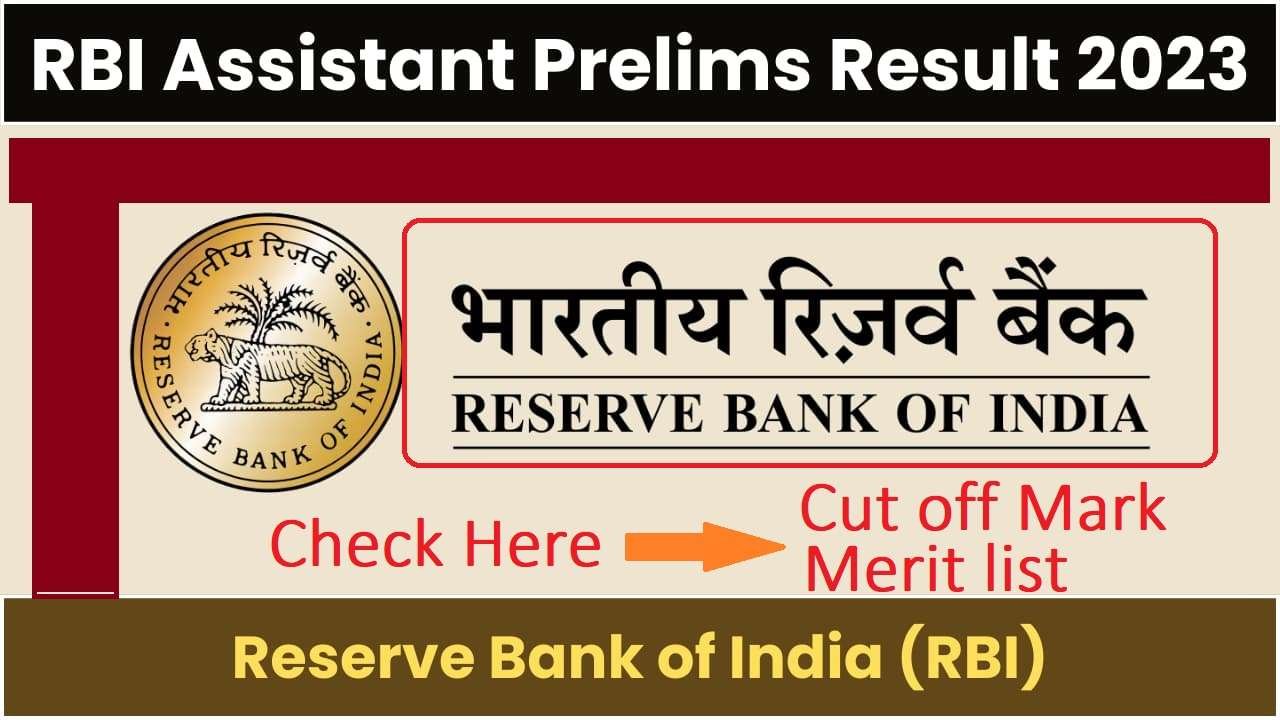RBI Assistant Recruitment 2023 Result with Marks, Cutoff, Phase II Mains Results for 450 Posts

Reserve Bank of India (RBI)
RBI Recruitment for the Post of Assistant 2023 Exam
WWW.SARKARIJOBTREND.COM
Brief Information:
Reserve Bank of India (RBI) has released a detailed notification for the RBI Assistant Recruitment 2023 of Assistant Post advertised in the year 2023. Candidates who have appeared for the RBI Assistant Exam can now download the result. For eligibility criteria, age limit, syllabus, selection procedure, exam pattern, state-wise recruitment, and other details, please refer to the official notification.
Important Dates:
- Application Begin: 13/09/2023
- Last Date for Apply Online: 04/10/2023
- Last Date to Pay Exam Fee: 04/10/2023
- Preliminary Exam Dates: 18-19 November 2023
- Preliminary Admit Card Available: 07/11/2023
- Preliminary Result Available: 15/12/2023
- Mains Exam Date: 31/12/2023
- Preliminary Exam Marks Available: 31/01/2024
- Mains Result Available: 06/03/2024
Application Fee:
- General / OBC / EWS: Rs. 450/-
- SC / ST: Rs. 50/-
- Payment Mode: Debit Card, Credit Card, Net Banking, or E Challan Mode
Reserve Bank of India RBI Assistant Notification 2023 Age Limit (as on 01/09/2023):
- Minimum Age: 20 Years
- Maximum Age: 28 Years
- Age Relaxation as per Reserve Bank of India RBI Assistant Recruitment 2023 Rules
| Join our WhatsApp Channel | Join Here |
| Join our Telegram Channel | Join Here |
RBI Assistant Recruitment 2023 Vacancy Details:
- Total Posts: 450
- Eligibility: Bachelor’s Degree in Any Stream with 50% Marks and proficiency in the local language.
How to Fill RBI Assistant Online Form 2023:
- Apply online between 13/09/2023 to 04/10/2023.
- Read the notification carefully before applying.
- Collect all necessary documents including eligibility proofs, ID proof, address details, and basic information.
- Prepare scanned copies of required documents such as photo, signature, and ID proof.
- Before submitting the application form, ensure all details are correct.
- Pay the application fee if required for form submission.
- Take a printout of the final submitted form for future reference.
Useful Links |
|||||||||||
Download Mains Phase II Result |
Click Here |
||||||||||
Download Pre Marks |
Click Here |
||||||||||
Download Pre Cutoff |
Click Here |
||||||||||
Download Exam Notice |
Click Here |
||||||||||
Apply Online |
Click Here |
||||||||||
Download Notification |
Click Here |
||||||||||
Official Website |
RBI Official Website |
||||||||||
About Reserve Bank of India :
The Reserve Bank of India (RBI) is the central banking institution of India and is responsible for regulating the country’s monetary policy and currency issuance. Established in 1935 during the British Raj, its functions have evolved over time to encompass a wide range of responsibilities aimed at maintaining financial stability and economic growth in India.
Key roles and functions of the Reserve Bank of India include:
- Monetary Policy Formulation: The RBI formulates and implements monetary policy in India with the primary objective of maintaining price stability while also ensuring adequate credit flow to support economic growth.
- Currency Issuance: As the sole authority responsible for issuing currency in India, the RBI manages the production and distribution of banknotes and coins across the country.
- Regulation of Banking Sector: The RBI regulates and supervises the banking sector to maintain the stability of the financial system. It sets guidelines and regulations for banks and financial institutions, monitors their activities, and takes corrective actions when necessary.
- Foreign Exchange Management: The RBI manages India’s foreign exchange reserves and formulates policies to regulate foreign exchange transactions to safeguard the stability of the external value of the Indian rupee.
- Developmental Functions: In addition to its regulatory functions, the RBI plays a crucial role in promoting financial inclusion, fostering innovation in the financial sector, and supporting economic development initiatives.
- Banker to the Government: The RBI acts as the banker and debt manager to the central and state governments, facilitating their borrowing programs and managing their accounts.
- Regulation of Payment Systems: The RBI oversees payment and settlement systems in India to ensure their efficiency, safety, and reliability. It also promotes the adoption of digital payment methods and innovation in payment technologies.
- Consumer Protection: The RBI is committed to protecting the interests of consumers in the financial sector. It establishes regulations to promote fair practices among financial institutions and resolves complaints and disputes between consumers and banks.